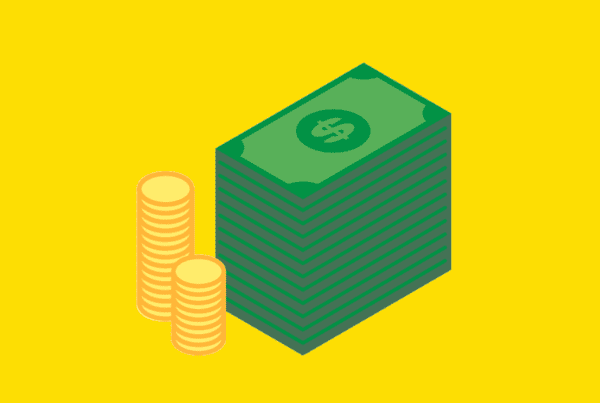How to finance your startup app development
A new startup idea and developing an app is an exciting prospect, with future opportunities to make money from users and customers, grow your app, and eventually sell the platform.
It’s the dream of many startup app businesses to grow and sell their idea for the maximum amount of profit and retire early. Sounds great, right?
But how do you get started when development costs potentially thousands and your startup business doesn’t have the capital that bigger players in the market have at their disposal?
This guide will discuss the financial options for starting up your app development.
Your questions about how to get funding for your app
How much funding do you need to create an app?
Depending on your target platform, the app development cost can range from a few hundred pounds to £200,000. Depending on the features your desktop or mobile app idea requires, you’ll likely need at least £5,000 to £10,000 in funding to start your app idea.
Can you develop an app with no money?
The short answer is yes; you can bootstrap your mobile app startup and develop an app without money. You can use no-code or low-code platforms to prototype or fully develop your app. You can also purchase app templates from online stores.
However, it’s not recommended. Why? Without any investment, your app will likely have fewer features – especially those that require advanced functions, be of lower quality, and take longer to develop if you have little to no development experience. No investment early on means you’ll likely see lower returns on your time investment.
How do you get funding at the idea stage?
It’s all about how much potential your great app idea has for investors. A well-crafted presentation to pitch your idea and business plan can help you secure funding for desktop or mobile app development, and there are a few tips to follow:
- Do your market research and ensure your idea is feasible and has growth potential. Investors want to know that their money will be put to good use and that your app has the potential to make them (and you) a profit.
- Keep your presentation short and to the point. Investors are busy people who don’t have time to read through a long proposal. Ensure you highlight the most critical points clearly and concisely: labour the problem and introduce your solution.
- Be prepared to answer questions. Prepare for tough questions around finance, ROI and your team – and have answers ready! Investors will want to know everything about your app – from how it works to who your target audience is.
What to do if you have an idea for an app but don’t know how to make it?
Many experts, like us (hello!), can advise on the best way to start, develop and maintain your app. Consider the following:
- What is your app looking to achieve?
- Does it bring something new to the market or improve an existing idea?
- How is your app going to make money?
- What devices is your app going to run on? Is it a web app, a mobile app or both?
What comes first, money or idea?
In our experience, the idea must come first. Having money and no idea is a great way to lose money chasing bad ideas. Funding is surprisingly easy to come across, but good ideas are rare. Make sure your idea is feasible, buildable and has the potential to make money or sell to a future investor.
How do I start a mobile app business?
Find opportunities in your industry. Look at what your competitors are doing and see if you could improve on existing apps or find opportunities in your own business to improve efficiency in sales/management/marketing or any business aspect that could be automated. You’d be surprised how many of your competitors now want to buy or subscribe to your app to improve their business!
What are the ongoing costs of building an app?
Apps need an ongoing source of funding, from hosting if your app has a backend platform to app store fees and – most importantly – continuous development of new features (and fixing those pesky bugs that new devices/OS updates tend to bring out!).
Why would you finance developing an app idea?
Your business may be lucky to have the capital to spend on funding for app projects today. But cash is king, and having that cash in your bank account is the best place for it.
Consider that any development could cost you £10,000 today or even £50,000 over a couple of months if your idea is complicated. That’s a considerable outgoing for any SME and can negatively affect your cash flow down the line if something happens where you need that capital quickly.
Using finance or funding allows your business to accurately predict exactly what money will leave your bank account every month, making cash flow much easier to manage.
It also means your app developer has access to all the funds they need to work on your project without the delays of invoicing, missed payments or accounting issues. Things move a lot smoother when money flows!
 8 Ways to raise funds for your new app startup
8 Ways to raise funds for your new app startup
Suppose you do not have the capital in your business to start your project today or prefer not to spend a large chunk of your cold hard cash. In that case, there are multiple options available to you to get funding for an app which can springboard your development plans without having to wait and watch your competitors get a headstart.
An important disclaimer: Riselabs is not a financial institution, and the information provided is as-is without any guarantees. The content of this article is our opinion on finance only!
What are the different funding options available?
- Personal loan
- Small business loan
- Seed Funding
- Credit card
- Home equity loan (aka re-mortgage)
- Venture capital investment or angel investor
- Crowdfunding
- A grant from the government or a foundation
Personal loan for your app idea
A personal loan is the most common option available to almost anyone, even if you don’t have a registered business. This could be to consolidate debt, pay for a wedding, or, in our case, finance a new business venture.
The interest rates on personal loans are usually higher than on business loans, so it’s essential to shop around for the best rate and be mindful of what guarantees will be expected of you. Personal loans can be used for any purpose, and there are no restrictions on what the loan can be used for, but some banks and organisations may have stricter limitations.
When looking for a personal loan, make sure you find one with a low-interest rate. This will make your payments manageable and help you avoid debt. You should also try to find a loan with a shorter term, so you can pay it off quickly – which will also encourage you to get your app out there and start making money!
Small business loan
Small business loans are specifically designed for businesses that may not have the credit history or collateral that a larger company would have. This is where many SMEs are when trying to break into a new market.
This type of loan can be used for various business purposes, such as buying new equipment, expanding your business, and – you guessed it – financing app development.
The loan amount and interest rates will vary depending on the lender and your credit score, but a small business loan could be a great option if you’re looking to get your business idea off the ground.
Make sure you compare interest rates from different lenders and read the terms and conditions carefully before signing anything. And as always, we recommend you consult with an accountant or financial advisor to make sure you’re making the best decision for your business.
Using a credit card to finance your business idea
Using a credit card could be a good option if you’re looking for a short-term loan to help get your business flying, but it’s not our recommendation due to credit cards having high-interest rates. However, with the right Googling, you could land a 0 interest cart that will give you a vast, sometimes multiple years, timeframe to clear the debt.
One thing to keep in mind: credit card companies will expect you to pay back your loan plus interest and – worth noting – fees if it’s not a zero-interest card. So make sure you understand the terms and conditions before signing up. Best to speak to your accountant about this one.
Also, compare the interest rates of different credit card companies before choosing one. The higher the rate, the more you’ll pay in the long run, even if the promotions look attractive.
That being said, using a credit card for development expenses can be a helpful way to get started without having to wait. Pay it off as soon as possible so you don’t incur any extra sneaky costs!
Home equity loan (aka re-mortgage)
Another option for financing your mobile or desktop app project – if you’re lucky enough to own or mortgage your home – is a home equity loan, also known as a re-mortgage. This type of loan allows you to use the equity in your home as collateral for a loan.
The interest rates on home equity loans are usually lower than on other types of loans, and the loan amount could be up to 85% of the value of your home (you’d need to speak to an expert about the amount as we’re going off what we could find). This could be a great option if you’re looking for a large amount of money to finance your project.
One downside to home equity loans is that you must use your home as collateral. If you can’t make your loan payments, the lender could foreclose on your home – ouch. So make sure you understand the terms and conditions of the loan before signing up so that your dream doesn’t take your home from you if it fails.
Seed Funding through an angel investor
Seed Funding is a type of financing that helps startup companies get their businesses started. It’s also known as startup funding, angel investment, or seed capital.
The typical funding amount is between £25,000 and £250,000. This type of funding is usually provided by individuals (angels) or venture capitalists, which we discuss more below.
It can help you develop your app by providing you with the financial resources you need to get started. It can also help you attract other investors and partners, which can be helpful in the long run.
The risks of Seed Funding are that you may not get the money you need to grow your business. You may also be giving up a lot of equity in your company, which could mean you don’t have as much control over your business in the future.
It’s also important to note that not all businesses are eligible for this kind of funding – your business must meet specific criteria to be approved. So, before applying for funding, ensure your business is ready and meets the requirements.
Venture capital investment
Venture capitalists and angel investors are willing to risk their money, often for taxable benefits, to get a larger return on investment down the road.
This type of investment can be a great way to get started, but it can be difficult to find venture capital firms interested in investing in early-stage businesses. And even if you see someone interested, they will want a piece of your company in return – often in the form of equity.
If you have little to no business to offer, the amount an angel investor could expect up to 50% of your business for them to invest in your idea. However, finding the right investor who has industry or even niche experience in your sector can catapult your app into the market with force.
The wrong investor with a mismatched personality to you can be an absolute curse on your project. Still, likewise, the right person can introduce you to all the right people in their network, including designers, developers, marketing experts and the end-user. In our experience, investors come in many different flavours, and we highly recommend you get to know anyone in depth before accepting any of that shiny money on the table.
Crowdfunding
Crowdfunding is another option for financing your project, as you raise money from individuals or organisations interested in helping you succeed. There are several different platforms for raising capital in this way, and each has its rules and regulations.
There are several advantages to crowdfunding:
- You don’t have to give up any ownership of your company unless you want to
- You can raise money from a large number of people
- It can help build hype around your product
- Early adopters often provide the best feedback
- It’s a great way to attract users if your idea is exciting
The main disadvantage is that crowdfunding takes a lot of time to put together and plenty of energy and time to promote and gain traction. But, with the right help onboard, a campaign can significantly exceed any other funding expectations, often surprising the business owner if the idea is just that good.
Use a grant from the government or a foundation
Government and foundation grants are a great way to finance your app idea without giving up any ownership of your company or taking on any debt.
Several types of grants are available, each with its rules, limits and expectations. Before applying for a grant, you must carefully read the terms, conditions, regulations, and requirements.
There are several advantages to grants:
- You don’t have to give up any ownership of your company
- You can get money for (effectively) free
- It can help build hype around your product
- Many grants are 100% funding, with some requiring you only to fund 20%
The main disadvantage is that finding the right grant that matches your requirements and that your project matches the grant requirements can be challenging. But it’s worth it!
There are several ways to find grants:
- Look online: Several websites list available grants, including https://www.find-government-grants.service.gov.uk/ and https://www.ukri.org/councils/innovate-uk/
- Contact a grant writer: A grant writer can help you find the best grant for your business.
- Contact government agencies or foundations: Many government agencies offer small businesses grants.
It’s all about ROI (Return on Investment)
When starting a business, you must consider the return on investment (ROI) of any funding you take for financing your adventures. Unless you’re a charity, spending someone else’s money should always come with a plan to pay that money back (and make more for you as profit).
This is the percentage of profit you earn on your investment, or in this case, how much you’ll need to recover to pay off your debts. A high ROI is essential to make money back on your investment and grow your business.
There are several things you can do to increase your ROI. One is to ensure you invest in an idea with a high chance of success:
- Are you confident in your market?
- Will your app make money? If so, how?
- Will you need more funding in the future in investment rounds?
- If you take thousands of pounds worth of investment today (from a loan, credit card or investment), will your app be able to start paying it back before it’s due?
You can also decrease your expenses to have more money to reinvest in your business; remember, developing an app isn’t just about the design and development costs; you have to also eat at the end of the day! And finally, make sure you know how your app will make money before taking any cash for your app.
How to find the best funding option for you and your business
Our recommendation? Speak to an expert. We’re just like you, spending money on our business, taking out loans or grants to move our business forward. We have experience being in the same position as you, but we speak to our accountants and financial advisors before signing any agreements.
It would be best if you considered your business’s financial trajectory and, as we said above, the ROI on any new projects you invest in or take out funding to develop.
How to get started with your app project
Developing a successful app nowadays is about more than just having a great idea – it’s also about knowing how to bring that idea to life.
For many would-be app developers, the hardest part is getting started. With so many moving parts and technical details to consider, it’s easy to get overwhelmed before you even begin coding. However, following simple steps can set you up for success and avoid common pitfalls.
First, take the time to flesh out your idea and define your target audience. What problem does your app solve, and who will be using it?
Once you have a clear vision for your app, start putting together a development team. Even if you’re coding the app yourself, it’s helpful to have others on board to provide feedback and help with the design.
Next, create a detailed roadmap for your project, including deadlines and milestones. This will help keep you on track as you move through the development process. Finally, don’t forget to budget for marketing and promotion – after all, what good is a fantastic app if no one knows about it?
Our final thoughts on funding your app development
Before you can get your app funded, you must clearly understand your options. Several different financing methods are available for funding your app, each with its advantages and disadvantages.
You’ll need to consider your needs and goals before choosing the best option for you and your tech startup. If you don’t have enough money to finance your project, there are still ways to get started. You can look into government grants, loans, private investors, or crowdfunding platforms. Once you’ve secured the necessary funding, you can start working on making your app dream a reality.
Got a project in mind?
Speak to our team about the costs associated with funding for your mobile app, potential investors and funding sources, and we can provide you with the technical information to help prove that your idea is viable and attract investors.



 8 Ways to raise funds for your new app startup
8 Ways to raise funds for your new app startup

